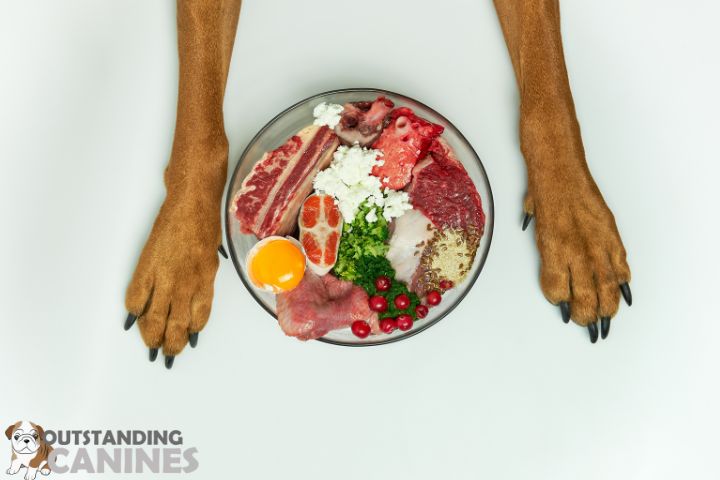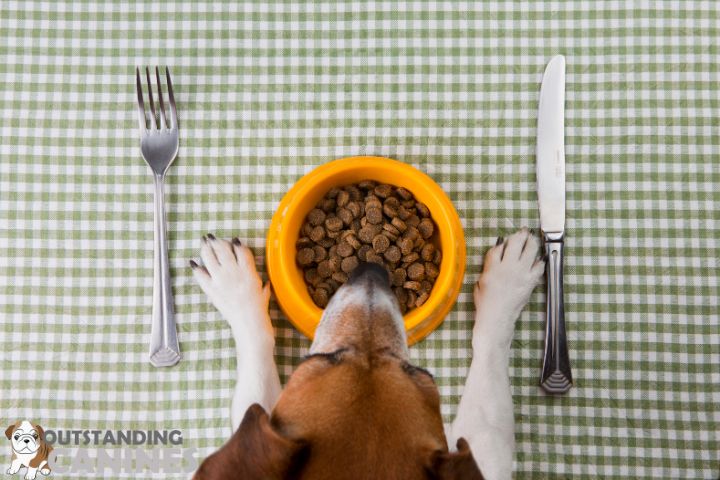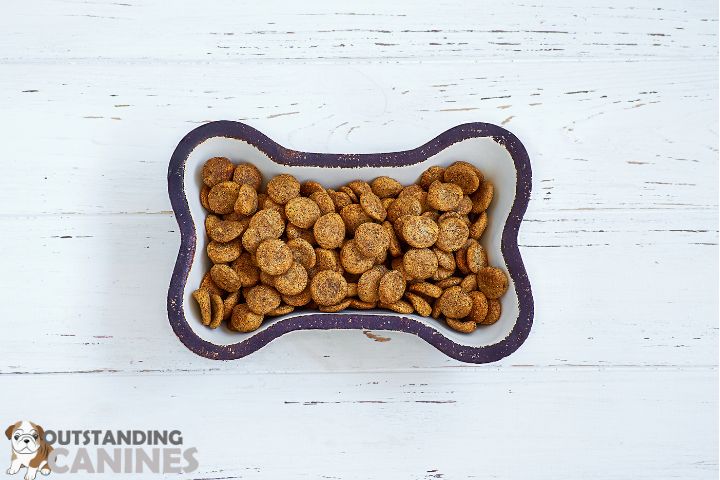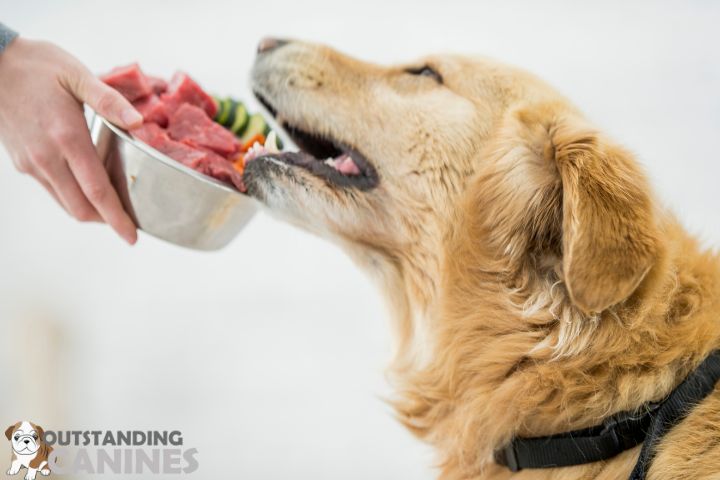Dog Diet Essentials: What Should Be in Your Dog’s Bowl?
2024-12-28 07:57:01

Welcome to the best reference on dog diet essentials! Whether you are a seasoned pet parent or a first-time dog owner, the general health and well-being of your dog depends on knowing what should be in its bowl. Dog nutrition goes beyond simply filling their bowl to ensure that every meal supports their long, active life. From the foundations of what to feed your dog to the most recent trends and breakthroughs in the field of canine diets, this complete guide will cover all you need to know about dog nutrition.
We will explore the basic nutrients every dog requires in this article, how to pick the best dog food, and the value of supplements and additions to round out their diet. We will discuss the arguments between wet and dry dog diets so that, depending on the particular requirements of your dog, you may decide which one is best. We will also discuss how to modify your dog’s food to fit various life phases and health needs, therefore making sure they get the right nutrition from puppyhood through their elderly years.
We will go over the advantages and drawbacks of homemade dog food for those thinking about it so you may make an informed decision on if this path is best for your pet. Keeping you current with the most recent developments in the industry, we will also discuss creative diet trends and what dog nutrition has ahead.
The Core Nutrients Every Dog Needs
The general health and lifetime of your pet depend critically on an appropriate dog diet. Regarding dog diet essentials, it’s about ensuring that every meal is loaded with the correct nutrients to keep your dog content and healthy. Let’s explore the fundamental nutrients a dog requires more closely and how they support their welfare.
- Proteins: The Components of Life
Dogs as much as humans depend on proteins as the basic building elements of life. For your dog’s development, healing, and general body upkeep, they are vital. The amino acids needed for muscle growth and tissue healing come from proteins. Puppies need enough protein for correct development and growth. Their bodies are fast developing at this time, and strong muscles and healthy tissues are created in great part from proteins.
For grown-up dogs, protein is just as crucial since it nourishes their immune system and preserves muscular mass. Active dogs—especially those in Vancouver who could go on hikes and outdoor adventures—need enough protein to rebuild and heal muscle following physical exercise. Given their slowed-down metabolism, protein becomes even more important for senior dogs in preventing muscular atrophy and supporting general health.
Meat (poultry, cattle, lamb), fish (salmon, tuna), eggs, and plant-based proteins such as lentils and chickpeas provide sources of premium protein in dog food. Make sure that protein is among the first ingredients on the list of dog food since this suggests a premium source of it.

- Fats: The Energy Source houses
The energy powerhouses of your dog’s diet are fats. They are essential to preserving good skin and a lustrous coat and offer a concentrated source of energy. Brain function and the absorption of fat-soluble vitamins (A, D, E, and K) depend also on fats. Vision, bone health, immune system function, and general cellular health all depend on these vitamins in some capacity.
Particularly helpful are omega-3 and omega-6 fatty acids included in fish oil and flaxseed. Omega-3 fatty acids lower inflammation, maintain cardiovascular health, and enhance cognitive ability. Healthy skin and coat come from omega-6 fatty acids. Including the appropriate level of fat in your dog’s food guarantees their continued vitality and health, thereby enabling them to accompany you on all your Vancouver excursions.
Healthy sources of fats should abound in a balanced diet from fish oil, flaxseed oil, chicken fat, and other animal fats. One should avoid too much fat since it could cause obesity and other medical problems.
- Carbohydrates: Power for Exercise
For daily activity, your dog gets most of its energy from carbohydrates. They give the running, playing, and general physical exercise fuel required. Additionally, a good source of fiber, carbohydrates support digestion and help to keep weight within normal range.
Excellent sources of carbs are whole grains including brown rice and oats as well as vegetables including sweet potatoes, peas, and carrots. These sophisticated carbs release energy gradually, thereby guaranteeing a consistent supply all day. To guarantee your dog receives a well-rounded meal supporting their energy levels and general health, carbohydrates should be matched with proteins and fats.
Grain-free choices abound for dogs with certain dietary requirements—that of allergies or sensitivities. Often using vegetables and legumes as sources of carbohydrates, these substitutes offer the same energy advantages without the grains.
- Minerals and Vitamins: Essential Micronutrients
Essential micronutrients of great importance for many body processes are minerals and vitamins. Bone health, immunological support, and general cellular operation all depend on them.
Strong teeth and bones need calcium and phosphorous. The skeletal health of your dog depends on it getting the proper balance of these minerals.
As antioxidants, vitamins A, C, and E help your dog’s immune system and guard her cells from harm. Vision, skin health, immune system function all depends on vitamin A. An essential antioxidant, vitamin C aids in tissue healing. As a potent antioxidant, vitamin E helps skin health.
Energy metabolism and the preservation of healthy skin and coat are processes involving B vitamins like folic acid, biotin, and niacin.
Making sure your dog gets a range of essential micronutrients can help to avoid deficits and maintain their best possible condition. Made to include all the vital vitamins and minerals your dog requires, commercial dog diets labelled as “complete and balanced” are To be sure your dog’s particular dietary requirements are being satisfied, though, it’s always a smart idea to see your veterinarian.
In essence,
Every dog requires proteins, lipids, carbs, vitamins, and minerals as its basic requirements. Your dog’s general health and well-being depend critically on every one of these nutrients. Understanding the value of these nutrients and making sure your dog’s food comprises them will help you to provide a balanced and complete diet that maintains health, energy, and readiness for all the experiences Vancouver has to offer.
How to Choose the Best Dog Food for Your Pet
Selecting the best dog food for your pet can feel like negotiating a labyrinth with innumerable choices and labels. Fear not, though! Understanding dog food labels, recognizing the distinctions between wet and dry dog food, and thinking through your dog’s age and size will help you make wise decisions about dog diet essentials, that will keep your furry companion healthy and happy. Let’s dissect every one of these elements to equip you to be a smart pet nutritionist.
Dealing with Dog Food Labels
Deciphering the Labels: Search for what you need here
The labels in the pet food aisles sometimes appear excessive. To guarantee your dog receives the greatest nutrition, though, knowledge of them is essential. Search for foods bearing American Association of Feed Control Officials’ (AAFCO) “complete and balanced” labels. This label indicates that the food offers your dog all the necessary nutrients in sensible quantities.
Ingredients Matter: Quality Above Mass
Look over the ingredient list for entire grains, good fats, and premium sources of protein. Rather than nebulous words like “meat meal,” the first item should be a recognized protein source—such chicken, beef, or salmon. Steer clear of foods heavy in fillers like corn, soy, and wheat as these have little nutritional worth and occasionally trigger allergies. Search for whole food ingredients; stay away from artificial colors, flavors, and preservatives. Better still, the fewer ingredients there are!
Adequate Nutritional Statements
Your guarantee that the food satisfies the minimal nutritional needs for your dog’s life stage comes from the AAFCO nutritional adequacy declaration on the label. Often included in the fine print, this statement, “This food is complete and balanced for all life stages,” guarantees it satisfies your dog diet essentials.

Foods for Dogs: Wet vs. Dry
Justification for Wet Dog Food
Usually with more moisture content, wet dog food can be helpful for dogs who get little water intake. Older dogs or those with kidney problems will find this quite helpful. Their hydration is maintained, and digestion may be facilitated by the elevated moisture content. For dogs with dental problems or missing teeth, wet dog food is also often more appealing and easier to eat.
Dry Dog Food: Its Advantages
Convenient, reasonably priced, and helps keep your dog’s teeth clean by lowering plaque and tartar accumulation, dry dog food—also known as kibble—is Unlike wet food, it keeps well and is easy to pack. As your dog eats, the crunchy texture mechanically cleans the teeth, therefore promoting dental health. For portion management, kibble also often is less messy and simpler to measure.
Learning the Correct Balance
Many owners of dogs discover that the best of both worlds is provided by combining wet and dry dog food. Combining wet and dry food guarantees a balanced diet that will make sure your dog gains from both kinds. Your dog’s tastes, health requirements, and lifestyle will help you to customize the combination. You might feed dry food in the evening for tooth health and wet food in the morning for hydration.
Considering Your Dog’s Age and Size: Customizing Puppy Nutrition
Puppies are fast growing and developing bundles of energy with dietary demands to promote their development. Their expanding bodies need more protein and calories to run on. Search for puppy-specific formulations with the correct mix of minerals, including calcium for healthy bones and DHA for brain development.
Adult Dogs’ Nutrition
To keep their health and vigor, adult dogs require a balanced diet. Their calorie intake should be changed depending on their degree of exercise to avoid obesity. Search for recipes meant for adult dogs that combine protein, good fats, and important minerals and vitamins.
Senior Dogs: Their Unique Requirements
Dog diet essentials alter with age. Senior dogs might need less calories but more fiber to maintain their intestinal integrity. Foods designed for older dogs sometimes contain antioxidants to promote cognitive function and supplements for joint health such glucosamine and chondroitin.
Size Counts: Small vs. Large Breeds
Small breed dogs may need more calories per pound of body weight than large breed dogs and have faster metabolic rates. They also often have smaller stomachs, hence eating high in nutrients is rather important. Large breed dogs, on the other hand, may benefit from meals including extra joint supplements since they are prone to joint problems. Their slower metabolism indicates they need less calories per pound to stop weight gain. Selecting a recipe tailored to your dog’s weight guarantees they get the right calorie count and nutrient density.
Finally,
Selecting the ideal dog food for your pet calls for more than just grabbing a can of wet food or kibble bag. Understanding dog food labels, recognizing the benefits and drawbacks of wet against dry dog food, and thinking through your dog’s age and size will help you make wise choices that promote their health and welfare. Recall that the general health of your dog depends on a balanced diet catered to their requirements; this will help them to remain active and content and ready to explore the stunning Vancouver surroundings with you.
Essential Additives and Supplements for a Complete Diet
Regarding dog nutrition, occasionally their normal food may require a small increase to guarantee they are obtaining all the necessary elements. This is where vitamins help. Including the correct supplements will assist your dog’s diet be complete and help meet certain health demands. Let’s explore some of the most helpful supplements and additives for your dog’s basic food.
Probiotics for GI Health
Harmonizing the Gut: The Probiotic Authority
Beneficial germs called probiotics help the gut to be healthy. Consider them as small fighters supporting digestion and preserving a balanced gut flora. Your dog’s whole health depends on a good stomach since it influences immune system response as well as nutrient intake. Probiotic pills help your dog’s digestive system, strengthen their immune system, and ward against gastrointestinal problems.
Resources and advantages
Probiotics abound in powder form, pills, and even dog treats enhanced with probiotics. Typical sources of probiotics for dogs are species of Lactobacillus and Bifidobacterium. These helpful bacteria assist in food breakdown, nutritional absorption, and control of bad germs. A dog that has a good gut will be happier and healthier overall; gastrointestinal problems will be less likely.
Chondroitin and glucosamine for joint health maintaining those joints free from damage
For joint health, chondroitin and glucosamine are like the dynamic team. Senior dogs or types prone to joint problems, such big breeds, especially benefit from these supplements. Dogs’ joints may grow stiff and uncomfortable as they age, which would reduce mobility and cause discomfort. Chondroitin and glucosamine assist lower inflammation, increase mobility, stop arthritis from getting worse.
Their Approach
As a building block, glucosamine helps cartilage—the cushiony substance covering the ends of bones in joints. It aids the restoration of cartilage and helps to preserve its integrity. Conversely, chondroitin lubricates and absorbs shocks by helping to retain water in the joint area, therefore preventing the degradation of cartilage. These vitamins used together will significantly improve the joint condition of your dog and help to maintain their active and lively nature.
Omega-3 Fats for Coat and Skin
The Key to a Shelly Coat
Maintaining good skin and a glossy coat requires omega-3 fatty acids. These good fats can help dogs with allergies or skin disorders and have anti-inflammatory effects as well. Often an indication of good health is a shiny coat; omega-3 fatty acids are mostly responsible for that.
Resources and Advantages
Omega-3 fatty acids abound in fish oil and flaxseed oil. Including them into your dog diet essentials will help lower dryness, irritation, and itching, therefore promoting better skin and a more lustrous coat. Omega-3s have also been demonstrated to offer anti-cancer qualities, promote cognitive ability, and help heart health. Fish oil put into their food will help your dog’s general appearance and condition be much improved.
Multivitamins for General Health Complementing Nutritional Deficiencies
By helping your dog acquire all the necessary vitamins and minerals for general health and well-being, multivitamin supplements can help close any dietary deficits. A multivitamin offers that additional guarantee even with a balanced diet; some nutrients may be deficient.
Complete Nutritional Support
Usually combining vitamins, A, C, D, E, and several B vitamins, multivitamins also include vital minerals including zinc and selenium. From enhancing the immune system and supporting vision to preserving good skin and encouraging metabolic processes, these nutrients assist a variety of body activities. See your veterinarian to find out whether your dog would benefit from a multivitamin supplement and to be sure you pick one that fits their need.
Customizing Supplements for the Needs of Your Dog
Customized Supplement Policies
Not all dogs will require the same supplements; so, any additions should be customized to their lifestyle and health requirements. Puppy, geriatric, active dogs, and dogs with medical issues all have different needs. For example, whereas a young, active dog may need extra omega-3s to support their high energy levels and preserve a healthy coat, an elderly dog might benefit more from joint supplements.
Visiting Your Veterinarian
See your veterinarian first to ensure you are adding any supplements to your dog’s diet make sense. They can offer directions on what supplements fit your dog’s age, breed, health condition, and general diet. Your veterinarian may also advise the correct amount and keep an eye on your dog’s condition to make sure the supplements are helping them without side effects.
Finally,
Your dog’s diet basics can be much improved by supplements and additions. Probiotics, glucosamine, chondroitin, omega-3 fatty acids, and multivitamins will help your dog have a complete and balanced diet and meet certain health needs. Always keep in mind that these supplements should be customized to fit the requirements of your dog and see a veterinarian for the best guidance. Your dog can lead a better, happier life ready to explore all the lovely paths and parks in Vancouver with the correct supplements.
Tailoring Your Dog’s Diet to Life Stages and Health Needs
Giving your dog the best care possible depends on knowing that their dog diet essentials vary throughout their lifetime. Dogs, like people, need various nutrients at different phases of life to support their development, preserve their health, and control age-related problems. Making sure your dog’s food basics fit these evolving needs will guarantee their success at all phases of life. Let’s look at ways to change their diets for senior dogs, adult dogs, and pups.
Puppies: Rising Strong: Puppy Dietary Requirements
Little bundles of energy with fast growing bodies, puppies need a diet high in proteins and calories. Their diets differ from those of senior and adult dogs. Puppies require diets with more proteins and lipids if they are to grow. Muscle development and tissue healing depend on protein; lipids give the energy needed for their great activity levels.
What to Look for in Puppy Food?
Choose food for your puppy from formulations meant especially for development and growth. Usually speaking, these foods include more fat and protein than adult dog foods. They should also contain vital minerals such DHA (docosahexaenoic acid), which aids in eye and brain development. Strong bones and teeth depend on calcium and phosphorous, which guarantees your puppy develops robust and healthy.
Puppy Diet Advice
Though little in tummies, puppies have great appetites. It’s better to feed them several little meals spread across the day than one or two big ones. This guarantees they obtain the nutrients they need and helps sustain their energy levels. Recall, consistency is absolutely vital. Maintaining a consistent feeding schedule, keep continuous observation on their development. See your veterinarian often to make sure they are reaching developmental benchmarks and to modify their food as necessary.
Adult Dogs: Preserving Health by Balancing Diet
The food needs of your dog and dog diet essentials change from puppy to adult. Adult dogs must have a balanced diet if they are to maintain their degree of activity and general health. The goal is to provide adequate nutrients to maintain muscular bulk, boost a strong immune system, and keep their vitality without overfeeding—which can lead to obesity.
Selecting Adult Dog Food Correctly
Think about your dog’s particular activity level and way of life. Active dogs—especially those in Vancouver that love outdoor pursuits like jogging and hiking—may require more calories to support their exploits. Conversely, more inactive dogs could need less calories to stop weight increase.
Retaining a Good Weight
In older dogs, weight control is absolutely vital. Among the several health issues fat raises are diabetes, heart disease, and joint problems. Check the weight and body condition of your dog often. Change their nutrition as needed and ensure they get regular exercise. Limit snacks and steer clear of offering table leftovers since they could load their diet with unnecessary calories. Regular veterinarian visits will enable one monitor their weight and general condition.
Senior Dogs: Ageing Beautifully and Their Dietary Needs
Dogs’ metabolism slows down and their nutritional requirements alter with age. Senior dogs may need less calories to stop weight gain but more fiber to help with digestion. Furthermore, helping them are nutrients that boost general vitality, cognitive ability, and joint wellness.
Choosing Senior Dog Meal
Dog diet essentials meant for elderly dogs can include supplements meant to help joint health and mobility, such glucosamine and chondroitin. Vitamins C and E among other antioxidants strengthen the immune system and help fight free radicals. Omega-3 fatty acids can help to lower inflammation and encourage a good coat and skin.
Senior Dogs’ Feeding Advice
Older dogs could have dental problems that complicate chewing. In such situations, especially made soft kibble or wet dog food can be simpler for them to eat. Senior dogs could be more likely to get dehydrated, hence make sure they always have fresh water available to stay hydrated. Monitoring their health and making any required nutritional changes depends on regular veterinary visits, therefore they become even more vital. Your veterinarian can assist you to create a diet that fits age-related medical issues and maintains the comfort and happiness of your senior dog.
Finally
The general welfare of your dog depends on dog diet essentials, being fit for their life stage and health requirements. From the high-energy needs of puppies to the maintenance needs of adult dogs and the specialized care needed for older dogs, every stage of life brings distinct dietary problems. Understanding and meeting these needs can help you to make sure your dog is happy, healthy, and active for their lifetime. Recall that dog nutrition mostly consists of a well-balanced feed, frequent veterinarian visits, and suitable supplements. Your companion will be ready to savor all the amazing pleasures Vancouver has to offer at any age thanks to a proper diet.

Homemade Dog Food vs. Commercial Food: What’s Best for Your Dog?
Many dog owners battle constantly between homemade and commercial dog food. Every solution has advantages and drawbacks; the optimal one for your dog diet essentials will mostly rely on its particular demands, way of life, and your capacity to offer a balanced diet. Let’s carefully look at both options so you might choose what’s best for your animal friend.
Benefits of Homemade Dog Food
- Control Over Ingredients: Tailoring to Specific Needs
Among the most dog diet essential advantages of homemade dog food is your control over the ingredients. For dogs with food allergies or sensitivity particularly, this control allows you to modify the diet to meet their specific requirements. Choosing fresh, high-quality foods can enable you to ensure that your dog is not exposed to any possible toxins or allergens.
- freshness and quality
Some pet owners would much prefer fresh, free from preservatives, homemade dog food. Fresh foods often indicate better taste and more nutritional content; hence your dog could find them more appealing. Making homemade dog food is a great way for those who give natural and organic foods first importance to ensure their pets enjoy the best quality food.
- Variance and flexibility
Making your dog’s food at home enables you to use a variety of ingredients and rotate multiple recipes to keep their meals appetizing. Changing the meals to fit your dog’s likes and your dog diet essentials will help to offer a varied and balanced diet. Dogs with particular dietary needs or health problems could find great advantage from this customizing.
Problems with homemade dog food: the requirement of knowledge in nutritional balance
While homemade dog food has numerous benefits, its balance and completeness depend on thorough knowledge of canine nutrition and careful preparation. If dogs are to thrive, they need a certain combination of proteins, lipids, carbohydrates, vitamins, and minerals. Ignoring any essential nutrient could lead to progressively deteriorating medical conditions. Speaking with a veterinary nutritionist will help you design a homemade meal meeting all of your dog’s dietary requirements.
- Time and effort
Making homemade dog food requires much time and effort. From selecting quality ingredients to measuring and heating food, it requires more work than merely pulling out a bag of commercial dog food. Pet owners with demanding schedules could find this commitment challenging.
- Financial Problems
Sometimes homemade dog food is more expensive depending on the ingredients you choose than commercially sold options. While you should always make investments in your dog’s health, you should also consider expenses and ensure your house will be viable with this decision.
Advantages of convenient and consistent commercial dog food
Made to deliver complete and balanced nourishment, commercial dog food is convenient. It is examined closely to ensure it follows dietary recommendations set by organizations such as the American Association of Feed Control Officials (AAFCO). This ensures that your dog absorbs the required ratios of all the nutrients.
variations and particular recipes
From dry kibble to wet canned food, there are various options to suit varied nutritional needs and preferences. There are formulations designed for dogs, adults, older pets, and even those with specific health issues including allergies, joint problems, or weight control needs. This variety makes it easy to find suitable commercial dog food for your dog’s specific demands.
Security and Protection of Quality
Reputable companies of commercial dog food follow rigorous safety guidelines and quality control policies. As a result, the food is manufactured under regulated conditions, therefore lowering the risk of contamination and guaranteeing product safety. Pet owners who might be worried about the possible dangers of homemade or raw food especially depend on this assurance.
Finding the proper equilibrium Combining diets: The perfect mix
Ultimately, the individual needs of your dog and your ability to provide a balanced diet will decide which of homemade or commercial dog food is best. Some owners decide to combine fine commercial food with handmade dinners. This approach lets you enjoy the benefits of both choices and ensures your dog receives balanced meals.
See a veterinarian to explore
See your veterinarian first to be sure your dog’s food change is sensible. They could provide directions on the suitable foods for your dog’s age, breed, condition, and way of life. Your veterinarian can also recommend specific supplements or tweaks to ensure your dog’s diet is nutritional enough.
Finally
Your choice of homemade versus commercial dog food will depend on the individual needs of your dog, your way of life, and your ability to provide a balanced diet. Both decisions have benefits and cons; the best one would be a combination of the two. Knowing the advantages and disadvantages of every option helps you to make a smart decision ensuring your dog receives the best possible diet.
Innovative Diet Trends: What’s on the Horizon for Dog Nutrition?
Dog nutrition and dog diet essentials are an always changing field with constant new trends and advances. Pet owners search for meals that fit both nutritional science and their personal values as they grow more concerned of the health and welfare of their dogs. Let’s investigate some of the most creative and interesting diet trends influencing dog food in going forward.

Grain-Free Foods
The Revolution in Grain-Free Food
Over the past years, diets free of grains have been somewhat fashionable. Focusing instead on premium protein sources and vegetables, these diets omit grains including wheat, maize and soy. Grain-free diets are based on the theory that dogs, descended from wolves, flourish on a diet more akin to their original feeding patterns, which mostly comprised of meat and very few or no grains.
- Features of Grain-Free Diets
When fed a grain-free diet, many dog owners find that their animals exhibit improvements in digestion, skin issues, and general energy levels. Dogs with grain allergies or sensitivity may find very helpful these diets. Sweet potatoes, peas, and lentils are common components in high-quality grain-free dog diets since they offer required carbs without the grains.
- Factors and Nutritional Harmony
Grain-free foods can help, but make sure your dog still gets all the nutrients it needs. Not all grain-free foods are produced equally, and some could lack required minerals and vitamins. Selecting a whole and balanced grain-free recipe that fits your dog’s dietary requirements is vital. Before changing your dog diet essentials, always see your veterinarian to be sure it is the best option for your pet.
Raw Food Lists
- Returning to Nature Using BARF
Raw meat, bones, and vegetables define raw food diets, sometimes referred to as BARF (Biologically Appropriate Raw Food) diets. Proponents of raw diets contend they offer a more natural and nutrient-dense diet more in line with what wild ancestors of dogs would have consumed.
- Raw Food Diets: Their advantages
Raw food proponents assert many advantages, including shinier coats, better skin, cleaner teeth, more energy, and better digestion. Emphasizing whole, unadulterated foods, the diet can improve general health. Raw diets frequently call for organ meat, muscle meat, bones, and a range of fruits and vegetables.
- Challenges and Carefulness
Raw diets must be handled and cooked properly even if they ensure a balanced diet and help to avoid contamination. Dangerous bacterial infections including salmonella and E. coli can affect both people and dogs. One must use strict hygiene standards while cooking raw food. Moreover the challenge with raw food diets is ensuring a balanced meal with proper nutritional ratios. Speaking with a veterinary nutritionist will help you design a raw diet meeting all your dog’s dietary requirements.
Ethical and sustainable decisions based on plants
Plant-based diets for dogs are becoming more and more popular as pet owners search for ethical and sustainable food options. Using plant-based proteins including lentils, chickpeas, and quinoa, these diets present a more ecologically responsible replacement for traditional meat-based meals.
- Nutritional Appropriacy of Plant-Based Diets
Dogs can thrive on plant-based diets and are omnivores, but it’s crucial to ensure they obtain complete and balanced nutrition. Plant-based diets must be painstakingly created to provide dogs all the essential minerals, vitamins, and amino acids. Excellent plant-based dog diets provide a variety of protein sources, including soy, lentils, and peas, therefore ensuring nutritional fullness.
- Advantages of vegan diets
Concerns about the environmental effects of meat production and animal welfare drive many pet owners towards plant-based diets for their pets. Dogs with some dietary allergies or sensitivities may also benefit from plant-based diets. These diets can also help to lower some health risks and improve digestion.
Tailored Diet
The Prospect of Customized Diets
Dog nutrition’s future might include more customized diets catered to the demands of every dog. Customized meal programs based on your dog’s genetic profile, health status, and lifestyle are being made possible by advances in nutritional research and technology.
Nutritional Policies and Genetic Testing
Businesses are starting to give canine genetic testing, which might reveal information on their dietary requirements, possible food sensitivity, and inclination to health issues. This knowledge can help you design customized diets tailored especially to your dog’s particular needs.
Health Surveillance and Corrections
Customized nutrition also entails consistent health monitoring and dietary adjustments for your dog as required. This method guarantees that your dog adapts to changes in their health and way of life and gets the best nutrition all their lifetime. Customized diets contribute to better general well-being by helping more precisely prevent and control health problems.
Finally
Novel diet trends are always changing the field of dog nutrition and dog diet essentials. From plant-based diets and individualized nutrition regimens to grain-free and raw food diets, there are many fascinating advancements ahead. Every one of these trends presents both possible advantages and drawbacks; the ideal option will rely on your dog’s particular requirements and your own tastes. Keeping current with these trends and working with your veterinarian will help you make the best food choices for your pet.
In summary
The health and welfare of your dog depend on them getting the correct nutrients. Knowing the dog diet essentials, how to select the best dog food, and the value of supplements and additives will help you to offer your pet a balanced and comprehensive diet. Making good decisions will depend on customizing their diet to their life stage and health needs and recognizing the benefits and disadvantages of homemade rather commercial dog food. Maintaining the pleasure, health, and vigor of your dog requires you to be current with the most recent advancements in canine diet. Remember a well-fed dog is a happy dog ready to spend many wonderful experiences with you in beautiful Vancouver.



